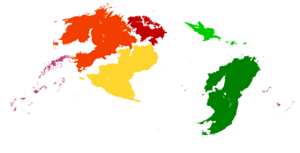Teleon
This article is incomplete because it is pending further input from participants, or it is a work-in-progress by one author. Please comment on this article's talk page to share your input, comments and questions. Note: To contribute to this article, you may need to seek help from the author(s) of this page. |
 The six continents of Teleon. | |
| Designations | |
|---|---|
| Earth, the World | |
| Orbital characteristics | |
| Eccentricity | 0.026 |
| 365.593 d | |
Average orbital speed | 27.3 km/s |
| Satellite of | Luna |
| Physical characteristics | |
Mean radius | 4,891.1 km |
| 296,012,380 km2 | |
| Mass | 5.972×1024 kg |
Mean density | 7.280 g/cm3 |
| 9.694 m/s2 | |
| 10.706 km/s | |
| 0.9972 d (23h 49m 6.3s) | |
| 24.04° | |
| Atmosphere | |
Surface pressure | 100.2834 kPa |
Teleon, commonly referred to as Earth or the World, is a terrestrial planet orbiting the Sun. It is the fifth-largest and fifth-most-massive object in the Solar System, as well as the only currently known celestial object in the Solar System and the known universe to harbor and sustain life. Additionally, it is the largest and densest of the Solar System's rocky planets. Teleon constitutes a binary planetary system together with its only natural satellite, the Moon or Luna, that makes up 40% of the binary system's total mass and interacts with the respective other gravitationally.
Teleon is unique in that its surface consists partly of liquid water, both as salt-water and freshwater, making up the hydrosphere, and an active planetary geology with mechanically rigid tectonic plates constituting the lithosphere above a planetary interior of a solid inner core, fluid outer core and convecting mantle layer, active geothermal activity which produce volcanic activity, earthquakes and a stable geomagnetic field. This allows the planet to have developed a rich atmosphere consisting mainly of nitrogen, oxygen and other gasses, which in turn results in the constitution of the water cycle, greenhouse effect and weather existing as a dynamic system on Teleon.
Various factors such as the aforementioned and particularly Teleon's distance from the Sun allowed for the planet to proliferate anaerobic and later aerobic life some 4.1 billion years ago. Since, life has evolved and thrived over long periods of Teleon's history, spawning a plethora of biodiversity and occassionally punctuated by mass extinction events. Today, the modern human (homo sapiens) inhabits Teleon and has increasingly altered its climate and atmosphere, biosphere and surface in what is dubbed the "anthropocene". Having ascended as a global species, it has established various societies of ethnicities, religions, sovereign states and ideologies, and made significant progress in culture, arts, sciences, economic prosperity, and quality of life.
Etymology
Geophysical characteristics
Oceans and continents
Most of Teleon's surface is subdivided into oceans, which constitute the majority of its hydrosphere, and continents, which are the planet's largest landmasses. By convention, the four oceans consist of the Alconian, Galanic, Glacian, and Medan, generally seen as parts of a continuous world ocean, while the five regions considered as continents consist of Abaria, Calesia, Elia Australis, Elia Borealis, Galania, and Hylasia. The boundaries of the continents are also influenced, albeit often times arbitrarily, by the groupings of sovereign states into regions defined by joint historic and or cultural heritage. By geologic perception, Teleon's continents roughly correspond to the surface presence of continental crust, though continental crustal fragments such as various islands and continental crust submerged by the ocean are not commonly referred to as distinct continents.
Due to Aurorum's vivid tectonic and other geological activity, its surface and relief is made up of ocean trenches and graben, plateaus, mountain ranges and other forms of topography. The deepest underwater location of Teleon's seabed is the Tartarus Deep of the X Trench in the western Alconian Ocean, with a depth of 11,038 m (36,214 ft). Teleon's highest mountain above sea level is the Tongfong, located in the Hakul Mountains and its elevation established to be 8,684 m (28,491 ft).
| Name | Largest country | Most populous country | Total population | Largest city | |
|---|---|---|---|---|---|
| Abaria | 812,642,093 | ||||
| Calesia | 319,975,941 | ||||
| Elia Australis | 139,411,400 | ||||
| Elia Borealis | 44,823,900 | ||||
| Hylasia | 62,703,800 | X | |||
| Galania | 415,311,742 | X |
Orbit and rotation
Atmosphere
Hydrology
Satellites
Life on Teleon
Human geography
| Flag | Sovereign state | Capital city | Population | Area | Population density |
Continent | Head of state | Head of government | nominal GDP | Form of government |
|---|---|---|---|---|---|---|---|---|---|---|

|
Dahemia | Gonece | 2,183,805 (2021) |
3,203.6 km2 (1,236.9 sq mi) |
681.7/km2 (1,766/sq mi) |
Calesia | Minister-President Ulrich Barschel | $148.3 billion (2023) |
Parliamentary republic with an executive president | |
| Falland | Sydenham | 84,372,472 (2015) |
339,336 km2 (131,018 sq mi) |
258.29/km2 (669.0/sq mi) |
Calesia | Monarch Theresa | Prime Minister Karren Shroff | $3,504.0 billion (2021) |
Constitutional monarchy | |

|
Free States | Saint Leon | 44,823,900 (2018) |
782,860 km2 (302,260 sq mi) |
57.27/km2 (148.3/sq mi) |
Elia Borealis | Supreme Executive Council of the Union of Elian Free States | $310.0 billion (2018) |
Parliamentary republic | |
| Hyacinthe | Lisieux | 87,532,230 (TBD) |
453,742 km2 (175,191 sq mi) |
192.91/km2 (499.6/sq mi) |
Calesia | First Representative Alban Vaillancourt | $3,434.0 billion (TBD) |
One-party state | ||
| Nadauro | Itabira | 139,411,400 (2021) |
1,908,284 km2 (736,793 sq mi) |
73.06/km2 (189.2/sq mi) |
Elia Australis | President Nataniel Magalhães | $1,391.6 billion (2021) |
Presidential republic | ||

|
Razan | Sekizbulut | 160,221,093 (TBD) |
6,587,948 km2 (2,543,621 sq mi) |
24.29/km2 (62.9/sq mi) |
Abaria | TBD | TBD | $1,920.0 billion (TBD) |
Parliamentary republic |

|
Ruthen, East | Sagard am Möhne | 17,736,242 (2021) |
122,148 km2 (47,162 sq mi) |
150.492/km2 (389.8/sq mi) |
Calesia | President Johanna Kohnstamm | Minister-President Rebecca Blankenburg | $742.13 billion (2021) |
Parliamentary republic |
| Ruthen, West | Thessen | 65,475,392 (2020) |
206,291 km2 (79,649 sq mi) |
321.79/km2 (833.4/sq mi) |
Calesia | President Gunnar Schönau | Minister-President Tilmann Rosenblatt | $2.149.0 billion (2020) |
One-party state | |
| Vistulzka | Włocławek | TBD (2024) |
396,297 km2 (153,011 sq mi) |
TBD/km2 (TBD/sq mi) |
Calesia | President Józef Wojciechowski | $TBD billion (2024) |
Semi-presidential republic | ||

|
Waldrich | Alsvik | 62,775,800 (2020) |
332,759 km2 (128,479 sq mi) |
188.65/km2 (488.6/sq mi) |
Calesia | Foresitter Mats II | Lawspeaker Anders Kjeldsen | $2,837.0 billion (2020) |
Constitutional monarchy |
| Yingok | Dongsing | 652,421,000 (2022) |
6,485,823 km2 (2,504,190 sq mi) |
100.59/km2 (260.5/sq mi) |
Abaria | President Yeung Kapkaa | $9,122.0 billion (2022) |
Presidential republic | ||
